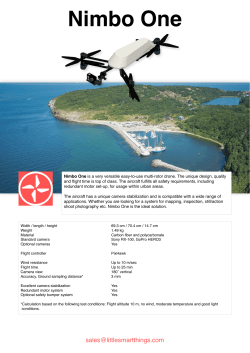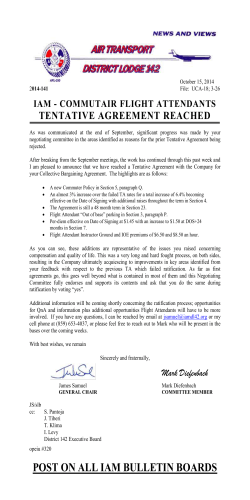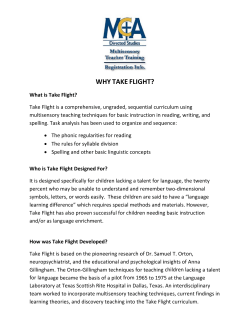
Aviation Safety in Canada: Flight Data Monitoring Transport Canada Civil Aviation
Aviation Safety in Canada: Flight Data Monitoring Transport Canada Civil Aviation November, 2014 1 RDIMS 7934033 PURPOSE To provide an overview best practices related to Flight Data Monitoring in Canada Captain Gordon Andrews Technical Team Lead, Westjet and Westjet Encore National Flight Operations - TAROA Transport Canada / Government of Canada gordon.andrews@tc.gc.ca TRANSPORT CANADA Responsible for the Government of Canada’s transportation policies and programs. oversees the safety, security, efficiency and environmental responsibility of Canada’s air, marine, road and rail transportation. Strategic Objectives An efficient transportation system A clean transportation system A safe transportation system A secure transportation system CIVIL AVIATION Mandate • Aviation Safety program develops and administers programs, policies and regulations for the safest civil aviation system for Canada and Canadians using a systems approach to managing risks Roles and Responsibilities • Provides aviation safety oversight through the following activities: – – Services: • issuing documents to individuals (i.e., pilots, aircraft maintenance engineers, dispatchers); • issuing operating certificates to organizations (i.e., air operators, aircraft maintenance organizations, airports); and, • certifying aeronautical products (i.e., aircraft) Surveillance: • monitoring the aviation industry for compliance of the regulatory framework primarily through assessments, inspections, audits and enforcement 4 INTRODUCTION • In 2005, TCCA embraced a systems approach to aviation safety through the introduction of Safety Management Systems (SMS) regulations for key areas of aviation • Transport Canada’s surveillance program includes on-site inspections, such as aerodrome inspections, special purpose inspections, facility surveillance, inflight inspections, ramp, cockpit, or cabin inspections, instructional techniques monitoring inspections, and aircraft inspections. • These on-site inspections are built into Transport Canada’s surveillance schedule and can be planned or unplanned. • The department conducts inspections on aviation organizations to verify compliance with safety regulations. 5 THE SMS VISION • A fully integrated approach to SMS across all certificates • Better management of the aviation system through cross functional assessments of hazards and risks • Harmonized approach to surveillance across all enterprises – systems entry point • A proactive approach to aviation safety that considers the whole life cycle of flight from design to maintenance to operation through take off and landing! 6 SMS COMPONENTS 1. 2. 3. 4. 5. 6. 7. 8. a safety policy; a process for planning and measuring safety performance; a process for identifying hazards and evaluating and managing risks; a process for ensuring that personnel are trained and competent to perform their duties; a process for proactive internal reporting and analysis of hazards, incidents and accidents, and for taking corrective measures to prevent their recurrence; documentation of all the safety management system processes, and a process for ensuring that personnel are aware of their responsibilities in regards to them; a process for conducting reviews or audits of the safety management system processes, on a periodic basis and for cause; and any additional safety management system requirements that are prescribed under the Part of the Canadian Aviation Regulations under which the operations certificate is issued; SMS AND FLIGHT DATA MONITORING Safety Management Systems • Integrate safety into the daily operations of a transportation enterprise • Strengthen an enterprise’s capacity to address safety issues proactively • Build on the principles of quality management already embraced in most transportation industries • Provide a systematic way for industry to maximize opportunities to identify hazards, control risks and continuously improve • Move towards more effective compliance and more proactive management of risks • Foster a safety culture throughout the transportation system • Permit Transport Canada to prioritize and target its resources to areas requiring the most attention/risk mitigation Flight Data Monitoring • Voluntary approach • Source of information to support the various requirements of an SMS 8 SMS AND FLIGHT DATA MONITORING Hazard identification Risk management Occurrence reporting Performance measurement FLIGHT DATA MONITORING Quality/safety assurance 9 FLIGHT DATA MONITORING FLIGHT DATA MONITORING • Performance based • Using flight data analysis to support performance based initiatives • Data driven • Moving away from certain prescriptive requirements to identify gaps and opportunities for improvement PERFORMANCE MEASUREMENT • Use operationally relevant and meaningful performance and quality indicators • Isolate and extract the appropriate data for analysis • Collect the large volumes of operational data to support quantitative decision making in organizational and operational processes. CAPABLE OPERATOR CONCEPT “ The Federal Aviation Administration (FAA), rather than routinely modifying CFR 14 regulations, grants capable operators deviations or exemptions from prescriptive elements of alternate selection and fuel planning regulations.” * * (3-APP 1-2.2 FPFMM) CAPABLE OPERATOR CONCEPT FLIGHT DATA MONITORING SUPPORTS: Core Criteria for the development and implementation of operational variations PERFORMANCE MEASUREMENT FLIGHT DATA ANALYSIS: FUTURE INITIATIVES • Validation through data of the requirements for Performance Based Navigation • Enhanced use of Alternates FLIGHT DATA ANALYSIS • Do we regulate flight data analysis? If so, how? • Can we produce prescriptive regulations for flight data analysis?
© Copyright 2025





















